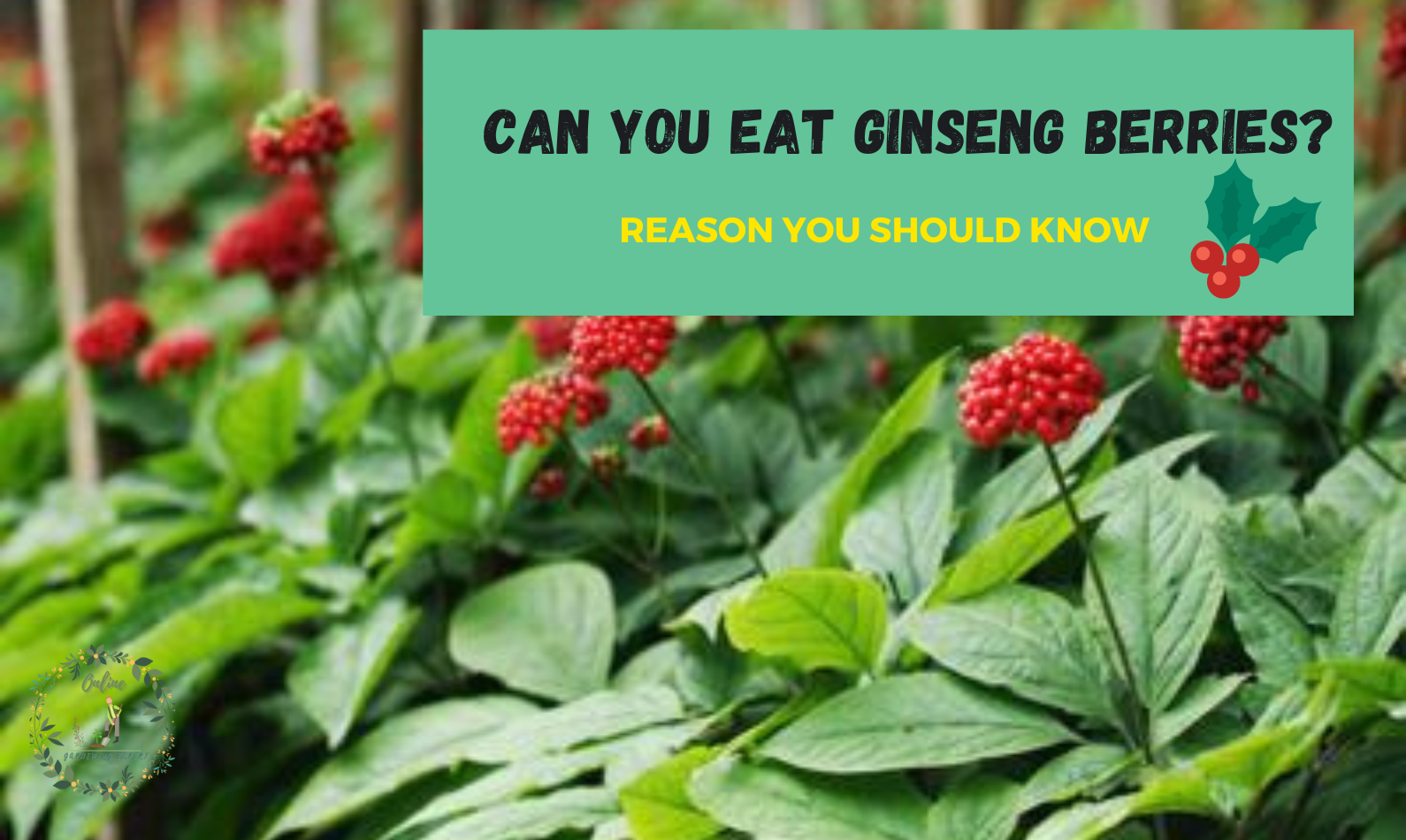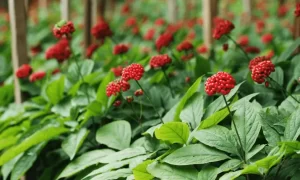Can You Eat Ginseng Berries? Ginseng’s health benefits have been valued for thousands of years, with the ginseng root being lauded as the most beneficial component of the Panax plant. However, a new study suggests that the tiny, red ginseng fruit may contain more active chemicals than the root. According to research, the ginseng fruit has a high concentration of ginsenosides, which are thought to be responsible for the ginseng berry’s advantages. Ginseng fruit also contains more vitamin E, vitamin K, vitamin B9 (folic acid), and potassium than Panax root.
Ginseng berries are not only edible, but they may also be beneficial to your health. According to some of the studies I’ve read, herbal medicine professionals believe that the berries of the ginseng plant provide many of the same benefits as the plant’s other components. Having said that, you may not want to eat them straight. Many individuals believe that while the berries are tart, they lack taste.
Health food aficionados have frequently complained that ginseng berries have a flat bitter taste that isn’t very attractive, so they’ve created a number of berry juice cocktails that improve the flavor by including other liquids. These are available at health food stores, or you may make your own by harvesting berries. Making your own is likely to be difficult, as you’d need a plethora of plants to produce a significant volume of juice.
Contents
Types of Ginsengs
Some ginseng plants thrive in the wild, while others are grown on farms. There are actually hundreds of distinct varieties since so many individuals have developed their own local variations, but all plants typically fall into one or more of these categories:
- Korean ginseng: This plant, also known as Panax ginseng, is most likely the original strain of ginseng from which all other plants descended. If you hear someone speak ginseng without any other name, they are most likely referring to this plant.
- South China ginseng has darker leaves than Korean ginseng and is also known as the three-seven root due to its slightly unique leaf arrangement.
- American ginseng: Because of its cooling and calming properties, this plant has long been a favorite of people who take ginseng roots as part of a traditional Chinese medicine regimen.
- Vietnamese ginseng: This broad-leaf plant is valued by herbal medicine practitioners as the southernmost ginseng type found in nature.
- Siberian ginseng: While this plant is related to ginseng, it is essentially a distinct shrub. Its berries contain a lot of calcium.
If you buy ginseng berries commercially, make certain that what you’re getting is genuine ginseng. Some plants, such as Dong Quai and even ashwagandha, are popular herbal medicines but are not really ginseng.
If you are not attentive to the source, internet vendors may get them all jumbled up and give you the wrong sort of product.
Read more about What mushrooms are safe to eat?
Importance of Ginseng Berries
-
Environmental Importance
Ginseng berries are essential to the survival of the entire ginseng species because they carry ginseng seeds. Farmers frequently sow the seeds of harvested ginseng in the same place to continue the growth cycle.
The native wild ginseng (Panax quinquefolius) of North America has been classified in Appendix II of the Convention on International Commerce in Endangered Species of Wild Fauna and Flora (CITES), which implies the plant may go extinct if the trade is not strictly managed.
When harvesting ginseng in Wisconsin, a state well-known for its wild ginseng conservation program, farmers are obligated to replant all wild ginseng seeds in the area of the parent plants.
-
Medicinal Importance
The majority of the advantages of ginseng berries are attributable to their high ginsenoside levels, which have been found to be beneficial for treating a range of medical problems, featuring anti-diabetic, anti-inflammatory, and antioxidative characteristics.
Numerous research has been conducted to investigate the anti-diabetic effects of ginseng fruit. Research published in Diabetes (2002) showed that ginseng berries corrected blood glucose levels in obese, diabetic mice by increasing insulin sensitivity, reducing cholesterol levels, and decreasing weight. Another research, published in the International Journal of Impotence Research (2012), looked at the effects of Korean ginseng berry extract on 119 men who had mild to moderate erectile dysfunction. They discovered that ginseng berries can enhance men’s sexual function and propose that they be used as an alternative therapy in such instances.
Furthermore, research published in the Journal of Ginseng Research (2016) shows that syringaresinol, an active ingredient in ginseng berries, has anti-aging properties that activate genes to help lengthen one’s lifetime.
In addition, an early study indicates that ginseng fruit may have anti-inflammatory and antioxidant properties. Though the specific process is unknown, it is thought that the interaction of ginseng berries’ active components with the cholinergic and serotoninergic neurotransmitter systems improves numerous brain functions.
Read more about Why Is Growing Ginseng Illegal? Everything you Should Know
Ginseng berry juice, ginseng berry extracts, and ginseng berry extract capsules are some Asian and American ginseng berry supplements now accessible, primarily through internet merchants. The cosmetic sector also provides a variety of skincare products based on the purported anti-aging effects of ginseng berries, such as creams, beauty masks, and ampoules for topical application. Ginseng berries have proved to be beneficial to the survival of the Panax species as well as the treatment of a variety of medical problems. Ginseng berry research is still in its early stages, and more research can only help us better grasp its full potential.
Health Benefits of Ginseng Berries
Ginseng berries and the juice that comes from them give many of the same advantages as consuming the roots. According to some studies, ginseng may have a significant influence on memory quality and may even assist people to deal with weariness.
According to preliminary studies, ginseng plants may also assist to relieve some elements of diabetes. It is thought that the plant accomplishes this by increasing insulin response rates.
If you have entire stems for any reason, don’t just separate the berries from them and discard the rest! Ginseng leaves aren’t as well-known as berries or even the more typical root extract, but they do offer certain health advantages. You could boil these into tea and flavor it with the otherwise very flat-tasting ginseng berries you collected. While it may not be the most delectable food on the earth, it is most likely high in antioxidants.
Side Effects of Ginseng Berries
Even if you eat a lot of them, parts of ordinary ginseng plants are generally regarded as harmless. I haven’t heard too many horror stories, but in principle, eating enough ginseng berries or roots in a single day might cause anemia.
According to what I’ve read, dry mouth and lips or irritation can be an issue, but I’m not sure how much you’d need to consume to overdose on them in this way. Many side symptoms of excessive intake, such as these and sleeplessness, seem similar to those linked with drinking too much coffee.
Conclusion
Ginseng berries are not only tasty, but they may also be good for your health. Herbal medicine specialists think that the berries of the ginseng plant give many of the same advantages as the plant’s other components, according to some of the research I’ve read.
Frequently Asked Questions
How to Eat Ginseng Berries and Prepare Them?
You may just wash the raw berries and consume them like any other fruit if you want. They’re absolutely fine to eat in this manner as long as you’re eating nothing but them all the time. That could be said about almost any dish. Otherwise, you may juice them or use them in any dish that asks for any other variety of fruit.
Learn How To Grow Ginseng Hydroponically? Complete Guide
However, because they don’t have much taste on their own, you could wish to cut them with a little amount of cranberry or blueberry mix. Try adding a splash of fruit juice when using ginseng berries as a topping or as part of a jar of canned preserves. To be safe, make sure to boil and treat your cans properly if you ever do this. Many culinary experts appear to believe that this should assist to compensate for the loss of flavor without the addition of refined sugar. Because they are berries, it appears that you could freeze them and serve them after thawing, just as you would with strawberries.
Can You Legally Sell Ginseng Berries as Food?
A bewildering array of laws regulate the harvesting of American ginseng! I was astounded to discover that just 19 states allow it to be harvested. Technically, many rules concerning the use of any part of a ginseng plant as food have more to do with its cultivation than with the selling of such plant components. This is the type of ultra-specific catch that only a lawyer would appreciate.
Learn more about How to Plow a Garden? Explained with Tips & Tricks
In general, you can only harvest berries from bushes that are five years old or older to use or sell. According to what I’ve learned from state conservation organizations, you’re typically only permitted to pick berries during a specific season, and you’ll almost always require a license.
Back in the 1990s, there was a large over-cultivation of ginseng roots, leaves, and berries as they became a health craze food, resulting in tremendous over-cultivation. As a result, several varieties of ginseng plants are now endangered, and officials have had to resort to some drastic measures to safeguard them.



